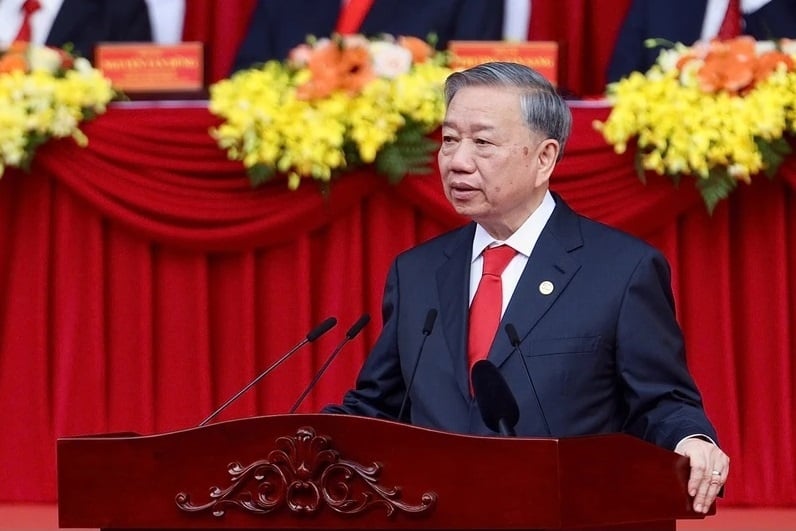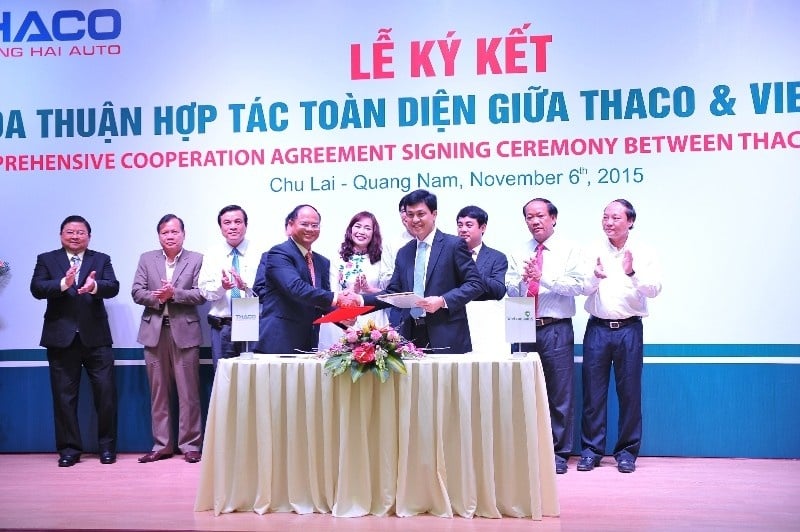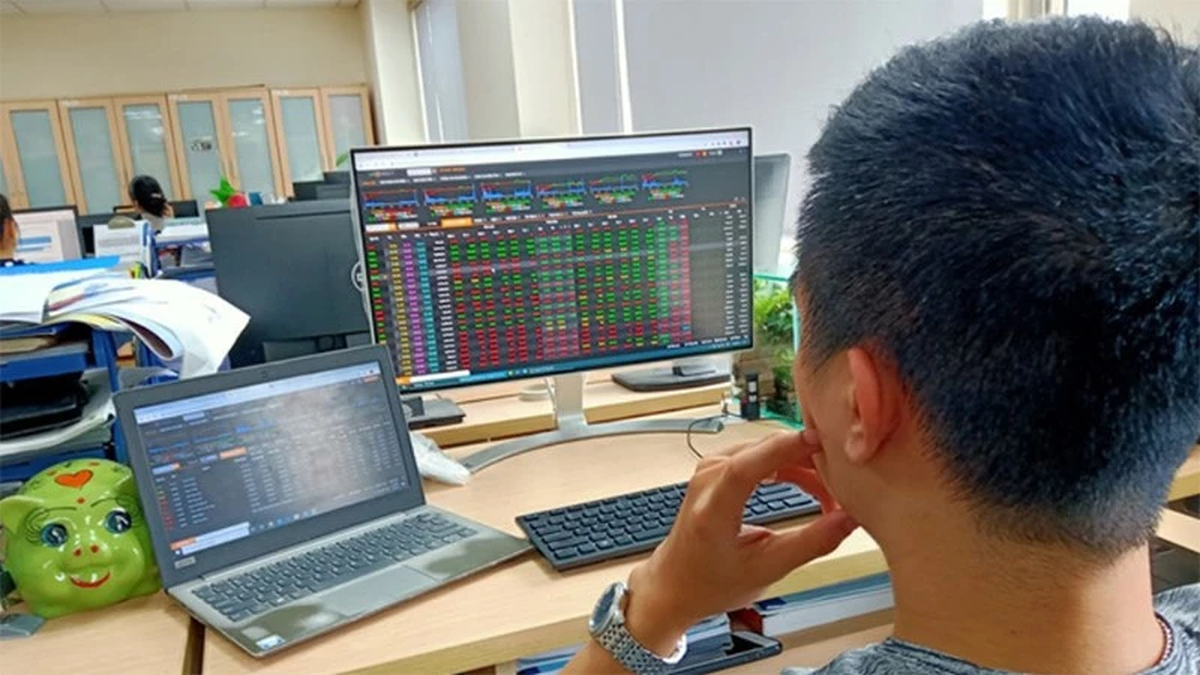 |
“We are standing at a new historical starting point to help the country rise up, take off, and “stand shoulder to shoulder with the world powers.” (General Secretary To Lam speaks at the ceremony, parade, and march to celebrate the 50th anniversary of the Liberation of the South and National Reunification Day, April 30, 1975 - April 30, 2025) |
Developing a socialist-oriented market economy
The 6th Party Congress in 1986, initiating the Doi Moi process, created a major and comprehensive breakthrough, bringing a new vitality to society when it determined that “There must be a policy to pave the way for workers to create their own jobs, stimulate everyone to put capital into production, business, save and consume to accumulate, expand reproduction on a social scale...; along with the development of the state-owned economy, collective economy, increasing the State's concentrated accumulation sources and mobilizing foreign capital, there must be a policy to properly use and reform other economic sectors”. The 6th Congress also affirmed that “It is necessary to amend, supplement and widely publicize consistent policies towards economic sectors... Eliminate biases in the assessment and treatment of workers from different economic sectors... create a favorable social psychological environment for implementing policies to use and reform a multi-sector economy”.
 |
| Behind the growth of large private enterprises, there is always the contribution of banks. |
This policy has aroused the entrepreneurial spirit and the desire to truly get rich in society; and has been further encouraged and strongly promoted with the "Revolution" of transforming the model from a single-level banking system to a two-level model consisting of the State Bank and commercial banks (specialized banks). From here, with the separation between management and business functions in the banking system, a real market for bank credit has been formed with the operation of commercial banks creating a driving force to promote comprehensive economic development.
"Determining that private economic development is a long-term strategy and policy of the country, in recent times, the banking sector has actively and synchronously implemented solutions to promote credit growth to meet the capital needs for production and business of people, enterprises in general and private enterprises in particular," said Deputy Governor of the State Bank of Vietnam, Dao Minh Tu.
The banking sector's support for the private economic sector has been increasingly extensive following the implementation of the State's policies, especially Resolution No. 09-NQ/TW dated December 9, 2011 of the Politburo on building and promoting the role of Vietnamese entrepreneurs in the period of accelerating industrialization, modernization and international integration. Next is Resolution No. 10-NQ/TW dated June 3, 2017 of the 5th Conference of the 12th Party Central Committee on developing the private economy into an important driving force of the socialist-oriented market economy.
In particular, the State Bank has operated a proactive and flexible monetary policy in accordance with market conditions, contributing to stabilizing the macro economy and creating a favorable business environment for investors. At the same time, it has strengthened the "support" for the private economy to become increasingly stable by building and perfecting the legal corridor, creating conditions for the system of credit institutions to develop in both scale and quality.
In particular, the State Bank of Vietnam has identified small and medium-sized enterprises as one of the five priority subjects in implementing credit policies, such as preferential interest rates for short-term loans in VND lower than those for normal production and business sectors; At the same time, it gives more preferential loan terms, repayment terms, and access procedures. Private enterprises are also beneficiaries of many preferential credit policies (on interest rates, terms, collateral, and specific risk handling mechanisms) according to economic sectors/fields, such as: Credit policy for agriculture and rural areas; Loan policy for supporting industry development; Loan program for forestry and fishery sectors; Loan program linked to the implementation of the Project of 01 million hectares of high-quality and low-emission rice in the Mekong Delta; Social housing loan program; Preferential credit programs of the State at the Vietnam Bank for Social Policies, etc.
Not only do credit institutions implement general incentive policies, but they also allocate resources to offer incentive packages specifically for the private sector, even building separate product packages and products for each segment. At the same time, the State Bank and credit institutions closely monitor economic developments to provide timely support to the private sector, increase resilience and endurance to recover and develop, such as policies to support businesses affected by the economic crisis, Covid 19, or storms and floods.
 |
| Bank-business connection programs are widely deployed. |
The policies of the Government and the Industry are increasingly permeating and penetrating into life along with the spirit of "symbiosis" and the programs connecting banks and businesses are widely deployed. Even in the early days of 2025, despite being busy with the arrangement and reorganization of units under the State Bank and following the orientation in Plan No. 141/KH-BCĐTKNQ18, immediately after putting the regional State Bank system into operation from March 1, 2025, the State Bank's Board of Directors organized working delegations led by the Governor of the State Bank and Deputy Governors of the State Bank to survey the operation of regional State Bank branches and organize conferences to promote local economic growth from North to South.
With the participation of local government leaders, businesses and credit institutions, many difficulties and obstacles were understood and resolved, supporting businesses to develop production and business. By the end of the first quarter of 2025, credit growth reached 3.93%, 2.5 times higher than the 1.42% of the same period last year.
Deputy Governor Dao Minh Tu said that by the end of 2024, the banking sector had hundreds of credit institutions supporting capital for the private economy with outstanding loans of nearly 7 million billion VND out of the total outstanding loans of the entire economy of 15.8 million billion VND (accounting for nearly 44%). "With the amount of capital accounting for 44% of the total outstanding loans, the lending turnover to the private economy is very large," he said. The increasingly fast cash turnover further proves the scale and efficiency of investment in this sector. In particular, in 2024 alone, lending turnover reached about 23 million billion VND, debt collection turnover was about 21 million billion VND.
The support of banks over the past four decades has become the fulcrum for the Vietnamese private economic sector to have remarkable developments. From a small, fragmented economic component that played a secondary role, it has risen strongly, becoming one of the leading important pillars of the economy and increasingly showing itself to be the most important driving force to promote national economic growth, contributing significantly to the completion of the socialist-oriented market economy in Vietnam.
With nearly one million enterprises and about 5 million individual business households, the private economic sector contributes about 51% of GDP, more than 30% of the state budget, creates more than 40 million jobs, accounting for more than 82% of the total workforce in the economy. These achievements also contribute to marking a resilient, breakthrough and development-hungry Vietnam in the nearly 40-year journey of innovation to become the 32nd largest economy in the world by 2024 and among the top 20 economies in terms of trade and foreign investment attraction.
The motivation to build Vietnam "over the past ten days"
“We are standing at a new historical starting point to help the country rise up, take off, and “stand shoulder to shoulder with the world powers”. To realize the aspiration to build Vietnam “more than ten days ago”, we need to liberate all production capacity, tap all resources, and promote all potentials and strengths of the country to strongly promote socio-economic development,” General Secretary To Lam said at the ceremony, parade, and march to celebrate the 50th anniversary of the Liberation of the South and National Reunification (April 30, 1975 - April 30, 2025).
In order to achieve economic growth of 8% or more in 2025 and double digits in the 2026-2030 period, and by 2045, to become a developed, high-income country with a socialist orientation, the General Secretary requested to focus on thoroughly resolving bottlenecks and bottlenecks in development institutions; adjusting economic space, expanding development space, strengthening decentralization, delegation, allocation and combination of economic resources; establishing a new growth model with science and technology, innovation and digital transformation as the main driving force to create strong changes in productivity, quality, efficiency and competitiveness of the economy, identifying the private economy as the most important driving force of the national economy".
“The private economy needs to strive to become the main force, taking the lead in applying technology and innovation, to achieve the goal of contributing about 70% of GDP by 2030; more and more private enterprises have the capacity to compete globally, master technology and deeply integrate into international value chains and supply chains; together with the whole country, build a dynamic, independent, self-reliant, self-reliant and prosperous Vietnam”. General Secretary To Lam (excerpt from the article Private economic development, a lever for a prosperous Vietnam) |
However, the development of the private economic sector still faces many challenges as businesses still face many difficulties. Most businesses are small and medium-sized, with limited financial resources and competitiveness. Not to mention that in 2025, the forecast shows that the world economic situation will continue to be complicated, with geopolitical conflicts, increasing trade tensions and high borrowing costs in many countries. The above difficulties will have a major impact on an open economy like ours, including the private economic sector.
“The banking sector is always ready with capital to meet the capital needs for production and business of enterprises,” emphasized Deputy Governor Dao Minh Tu. This spirit has been realized through the action plans of the entire banking sector for many years. Permanent Deputy Governor of the State Bank of Vietnam Dao Minh Tu said that the banking sector clearly identifies private enterprises as one of the subjects and components that must receive great attention in the process of organizing and implementing the activities of the sector. In order to have a better symbiotic relationship between banks and enterprises, Deputy Governor Dao Minh Tu assigned the responsibility to credit institutions, “to truly share and support enterprises, consider enterprises as partners, as an element in our ecosystem to accompany. The more difficult the enterprises are, the more banks must share.”
 |
| "Financial institutions must consider businesses as partners, as an element in our ecosystem to accompany us." Deputy Governor Dao Minh Tu |
In particular, in the context of science and technology, innovation and digital transformation being the main driving force to create strong changes in productivity, quality, efficiency and competitiveness of the economy in the coming time, the State Bank of Vietnam has issued Decision No. 1364/QD-NHNN dated March 5, 2025 to implement Resolution No. 57-NQ/TW of the Politburo on breakthroughs in science and technology development, innovation and national digital transformation and the Government's Action Program to implement Resolution 57-NQ/TW (Resolution No. 03/NQ-CP). In which, the Governor directed to "urgently and drastically perfect institutions; eliminate all thoughts, concepts and barriers that are hindering development". Build and perfect the legal corridor for banking activities in the digital environment, deploy breakthrough tasks of innovation with credit institutions. The Governor assigned credit institutions to proactively research, develop and deploy banking products and services to support and promote businesses, especially small and medium enterprises, business households and cooperatives, to implement digital transformation. At the same time, he announced a list of major problems in science and technology, innovation and digital transformation in the banking sector for Vietnamese digital technology enterprises to participate in solving...
However, according to policy experts, credit access support needs to be placed in the overall context of other policies supporting businesses such as: capacity building, market expansion, tax, land, etc. Therefore, there needs to be a synchronous participation of functional agencies to create a fundamental change in policy making, overcome limitations and promote the superiority of the market mechanism to support the private economic sector to improve labor productivity and innovation; Develop policies to reassure investors, businesses and entrepreneurs, build stronger trust between the State and the private economic sector, thereby encouraging businesses to boldly invest, innovate and participate in strategic economic sectors.
Policies needed to foster entrepreneurial spirit “To unleash the enormous potential of the private economic sector, we need policies to foster the entrepreneurial spirit, to further strengthen the freedom of doing business and to allow businesses to truly do what the law does not prohibit. These policies will create a foundation for the property rights and freedom of doing business of the people and businesses to continue to be affirmed. The management method of the management agency is based more on market principles and tools than on administrative decisions.” Dr. Le Duy Binh Economica Vietnam |
Source: https://thoibaonganhang.vn/thuc-day-kinh-te-tu-nhan-tro-thanh-mot-dong-luc-quan-trong-nhat-cua-nen-kinh-te-quoc-gia-163659.html






























![[Photo] National Assembly Chairman Tran Thanh Man visits Vietnamese Heroic Mother Ta Thi Tran](https://vphoto.vietnam.vn/thumb/1200x675/vietnam/resource/IMAGE/2025/7/20/765c0bd057dd44ad83ab89fe0255b783)








































































Comment (0)